Reflections
We invite Dehonians, co-workers and other collaborators in SCJ ministry to share their personal reflections regarding the impact of the coronavirus (COVID-19) in their lives and their communities. We will post the reflections as they are received:
Fr. Quang Nguyen, SCJ
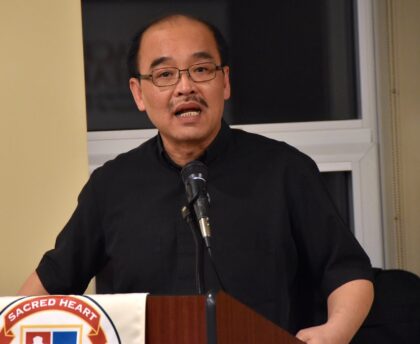
Around this time 45 years ago, the news informed Americans that their involvement in Vietnam was officially coming to a close. But for us – the approximately 20 million people of South Vietnam – it was not simply “the news.” It was our lives, lives that were negatively changed forever. Amidst the sound of artillery explosions and the chaotic atmosphere, many unanswerable questions were posed. Would there be a massacre? How would we be treated by the victors? What would our lives look like in the coming days?
I could see terrifying fear and fright in the eyes of my parents and neighbors. In short, my parents seemed to have lost all control over their lives and the lives of those entrusted to them. This uncertain future paralyzed the strong will of many. There was a choice that we had to make: move forward in faith, directly confronting whatever challenges or hardships that might come our way, or allow fear to stop us from living.
Our lives definitely changed. Vietnam is no longer our home. One thing that did not change – even in the most horrific moments – was our faith in God. Perhaps faith was the only motivation that propelled us forward. We trusted that all things would be well, and we surrendered our “control” to God because amidst so many evils, there were good people, events, and circumstances that allowed us to see with the eyes of faith the goodness and mercy of God in our lives. We could experience God’s presence at every turn.
Today, in the midst of the pandemic, I see the same terrifying fear and anxiety in the eyes of so many people. The unseen virus forces us to contemplate unanswerable questions just as my family did 45 years ago in Vietnam. What will our lives look like in the future? How will it be different? What will be the “new normal” look like? How can we avoid being infected by this deadly virus?
As Christians, and specifically, as members of the Priests of the Sacred Heart, we are called to go forth and bring the good news of God to others. Perhaps this is a perfect moment for each of us to demonstrate that we are people of faith and we are witnesses God’s love and mercy through the way we live our lives.
Read Fr. Quang’s full reflection.
Frater Kodjovi Hubert Liassidji, SCJ
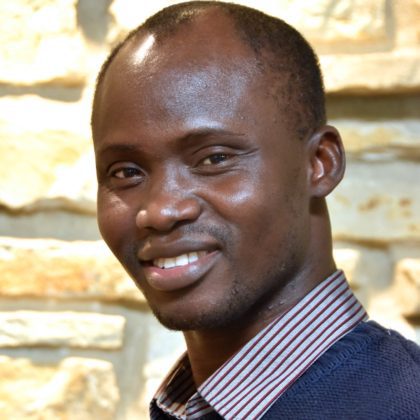
When I started the semester in January, I never thought that it would get to be harder and more difficult as it did. After my spring break, everything was turned upside down. Adjustments were made due the pandemic of COVID-19. In-person classes moved to online learning. It was a learning method that I was not used to and was often hard for me.
First, there was time management. All of my classes required a lot of time and intensive work; I had to learn how to properly make time for all of them. Self-motivation was also difficult. At first, I didn’t have any motivation for online learning. But with the encouragement, the help and the support of my brothers, I have come to understand that I need a positive attitude and a sense of determination to overcome these challenges. I am grateful that the lockdown affects neither my prayer life nor my community life.
This time of lockdown reminds me that I can do a lot of good from a distance. That is, without being present I can still offer help and generosity. Besides holding in my heart those who need my prayers, I can share happiness with people far away just with a phone call, a letter or an email to check on them and to let them know that they are in my prayers. Of course, one of my prayers is that this pandemic comes to an end soon so that we can begin to work toward more of a sense of “normal.”
Read Frater Hubert’s full reflection.
Celsus Robert (postulant)
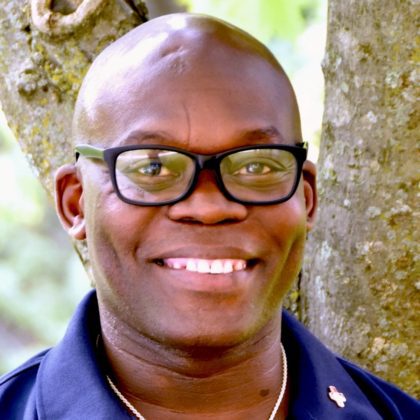
This epidemic hit us at a time when the Church was calling us into solidarity with each other during Lent. It was a time for deeper self-reflection and sacrifice; therefore, for me it was an easy transition into being creative and making the best out of this crisis. Some of us started a novena to the Divine Heart and then moved into more devotions and personal prayers, including Stations of the Cross.
The transition to online classes went fine for me, although the caseload became heavier with more online posting and discussions. I was able to utilize Zoom for most of my classes, and with this, I was still able to interact with my fellow classmates. I’ve had more free time to do things which I have been putting on hold. I tended to my little nursery in my room and out in the hallway, I spend more time praying and reading, and most of all I spend more time catching up on calls and emails which I had for too long not returned.
Overall, this Stay-at-Home order and transition to online education has been a productive time for me. I am able to spend more time with my fellow brothers in community. I spend more time using the indoor fitness center as well as playing indoor soccer with members of the community. Some of us even started cooking more often and inviting others to partake. Therefore, there have been benefits to this time, including a closer bond with God and with others around me.
Fr. Guy Blair, SCJ
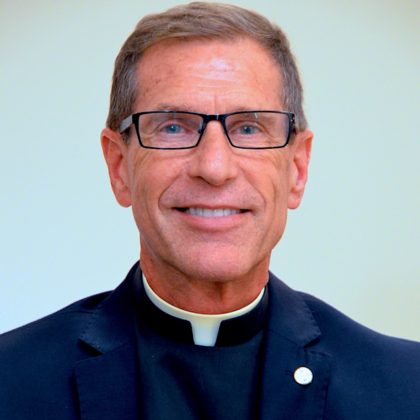
I caught a glimpse of her, or rather I glimpsed someone wrapped in a blanket in an alleyway near the Dollar Store. An old woman surrounded by the usual shopping cart filled with her belongings, sad. Back at my apartment, I considered her, perhaps 70 years old, homeless in the “greatest” country in the world.
It wasn’t an easy action for an introvert like me to do, but it began with the realization that this old woman might be someone’s mother; really, she was my sister. I made a meal and walked to the store. She was there and I offered her the meal.
“Is there anything I can help you with?” I asked. Surprisingly she responded, “I got everything I need here.”
I got everything I need here. Really? My face reddened at the embarrassment of myself and my inflated needs.
Despite whatever her issues are and what may have led an old woman into homelessness, she has not complained about social distancing, about deprivations because the stores are closed or that there are no beauty salons to get her hair done. She has not complained about feelings of disconnection. The COVID-19 virus, the disruption to social life and all the other situations that we find ourselves in, she has already experienced them and more. Her demeanor, her responses, are not based on complaints connected to the lack of comforts in her life. She has intimacy with pain, she seems to have accepted suffering as her companion.
Read Fr. Guy’s full reflection.
Fr. Albertus Joni, SCJ
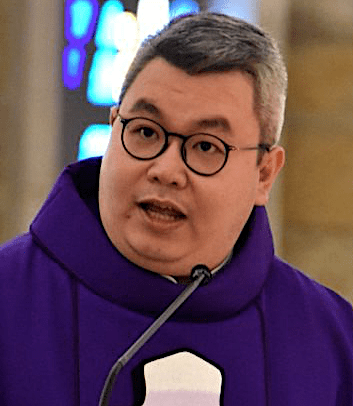
There is no better moment to reflect the on meaning of suffering than Holy Week. While we are approaching the sacred Easter season, I realize that both globalization and capitalism – two common “highways” toward a prosperous society – cannot properly solve our problems. This COVID-19 outbreak challenges me to see the other side of the coin. This pandemic shows us that the modern world desperately needs what Jesus has revealed to us all: solidarity. Through the cross, Jesus entered into full solidarity with the suffering of the world, with the vulnerability of being human. As Jesus went into the mystery of human death, He showed us that we – the disciples – also need to enter into the suffering of our neighbors.
While our society is heavily marked with social injustice and an ever widening gap between the haves and the have-nots, we, Christians, are called to show the world that our brothers and sisters are more than calculations, predictions, and numbers. Christians see their neighbor not only as an autonomous human being with rights and fundamental equality but as the living image of God the Father, redeemed by the blood of Jesus Christ and placed under the permanent action of the Holy Spirit. This is why self-isolation is NOT a reason NOT to act, to witness this truth. We can start simply by showing friendly gestures or encouragement in helping others in need.
I am proud of so many Dehonians who turn to social media platforms and broadcast their Masses and Eucharistic Adorations. They keep spreading the message of love and solidarity for the people in need of hope and encouragement. Every act of solidarity celebrates the love of God to humanity, and vice versa. It becomes an instrument of communion with God! Yes, this is a difficult time for everyone – yet, I do believe that this is also the moment to share the best of us and of what we believe in.
Read Fr. Joni’s full reflection.
Fr. Ed Kilianski, SCJ
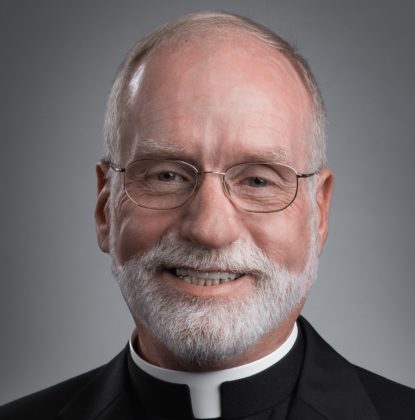
I find myself, as most of us do, living in a time of uncertainty and fear and I am thinking of my religious community, my family and friends. COVID-19 has certainly changed our lives and, I believe, how many of us perceive the new world in which we live. It certainly hasn’t been easy for any of us. This “Staying at Home” and “Social Distancing” is challenging.
It seems to me that in this global pandemic of COVID-19, God has mysteriously asked us for this sacrifice so that ultimately it may bring us closer to Him. And in our willingness to put it all on the line, this time will be partially spent being in need of others’ help at a socially acceptable distance. We may grow weaker so that Christ can grow stronger. When given the chance, let us be truly appreciative of those on the front lines of the pandemic: doctors, nurses, medical staff of all kinds.
I think, in trying to make sense out of this experience, I realize that it’s all tied up with Fiat and Ecce Venio.
Today, this is my prayer for you: that you trust deeply in the mercy of our loving Father, just as Jesus did. I know that this is difficult; we are human, and we are afraid. But we are in this together, as one Dehonian family, one people of God.
Br. Duane Lemke, SCJ
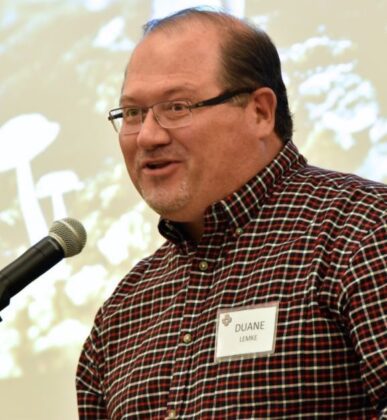
Peace in peaceful times is easy. Knowing peace in times of anxiety — that is the difficult part. Yet, ever since those anxious disciples gathered in the Upper Room, Christ has offered peace through the experience of his risen and living Body.
I have seen many attempts to find God in the pandemic. Some seek peace through faith in a God of protection. I certainly know that impulse to ask God to protect loved ones, the vulnerable, and, of course, myself. Yet if the Gospel, pastoral experience, and life have taught me anything, it is that God’s faithful are not immune from suffering. If anything, the cross and suffering seem to be a guarantee of Christian life.
Let us open our eyes to signs of love all around us, and offer thanksgiving for those who make God’s love present in suffering. Let us take a break from anxious headlines, the endless frantic posts and notifications of social media, and make space for prayer.
Read Br. Duane’s full reflection, which contains a link to a video message.
Mike Tyrell, president of St. Joseph’s Indian School
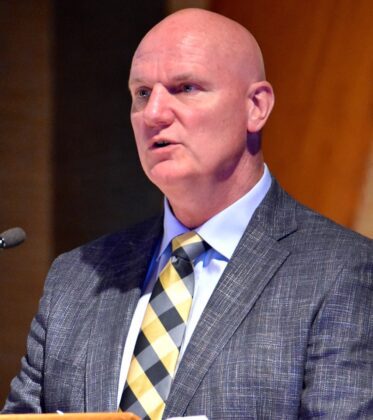
I am consoled knowing that God does not give us more that we can handle. One only has to look at the life and writings of Fr. Dehon. He speaks of the concept of abandonment, not from a place of uncertainty, but out of a spirit of “placing one’s plans in the hand of a loving God and accepting successes and set-backs, joys and disappointments, mistakes and triumphs.” It is this concept of surrender that I’ve found myself hanging onto through this period. It is part of a Dehonian Sprit that inspires us in this time of need.
I am bolstered in the knowledge that the organization will survive this based on two ideas. First, we are a blessed organization with an important mission. I truly believe this. That mission has played out with a history that includes great resilience and consistency. That foundation has helped carry us through to where and who we are today.
Second, we have survived some very difficult periods over the years. The challenges during the Great Depression should have closed the school: fire, drought, plagues of insects, etc. In the 1990s we survived a period of insolvency that would have ruined other organizations. In the 2000s there was the anthrax scare and the financial meltdown of 2008. We survived all of those large struggles and many smaller ones, so now we are here to fight through these challenging times. May God bless our students, their families, our supporters, our staff and the SCJs. Stay safe. Mitákuye Oyáśiŋ.
Fr. Juan Carlos Castañeda Rojas, SCJ

I see an awakening in many priests – priests and religious women who are finding new and creative ways to “get out of the sacristies” by using social media and other forms of communication. Mass celebrations, Adoration, praying the rosary, and even catechesis is being done online. They are reaching out to their parishioners when the people need it the most and I see how important it is for people to feel that even when the Church is physically closed, they still have a connection to it and God; they still belong to their home parish.
Today, as this pandemic affects the entire world, there may not be people physically in the church buildings. But it is clear that the Church lives in the hearts of people. Processions and other celebrations were silenced, but today we can hear people praying the rosary louder, praying from the balconies or the windows of their homes. People who hadn’t gone to Mass regularly are starting to do so online.
Today we may be locked in the sacristy, but that is just a physical space. The REAL sacristy is in our hearts. It is not easy for me to be at home knowing that many people need us today more than ever; it is not easy for many of us to be away from our ministries.
Read Fr. Juancho’s full reflection.
Fr. Rafael Querobin, SCJ (Houston community, OLG parish)
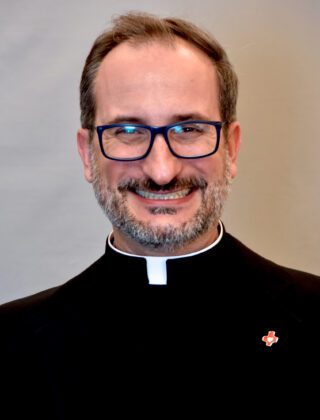
It is strange to look at the closed church, the school without students, and the empty office. Since March 15, my steps have been limited to a triangle between the rectory, the office, and the church. The masses that we broadcast on Sundays have been a way of keeping in touch with our parishioners and with people from all over the world. We are surprised by the number of people who have followed our broadcasts.
I have faced this time of detachment as if I were living in the novitiate again. I consider my novitiate to be a unique and special time. Of course, the circumstances are different and the concerns are many at the moment. I have tried to live a personal routine of prayer, reading, language studies, and physical activities (inside my room).
After this time has passed, we will have an enormous mission waiting for us. I am sure that we will need to be with people and accompany their needs. I believe that the most important thing for us right now is to live one day at a time and do what we always said we didn’t have time for.
Read Fr. Rafael’s full reflection.
Fr. Christianus Hendrik, SCJ (South Dakota community; provincial councilor)
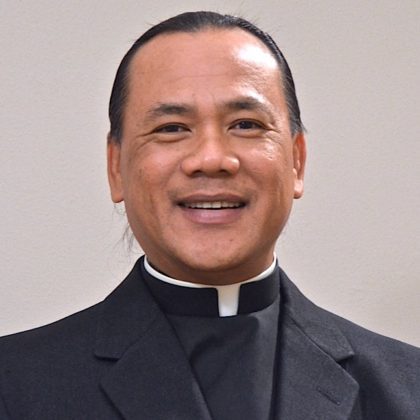
Surely, this is one of the hardest times for me as a priest, passing through weekends without being able to see my people in the parishes, celebrating the Mass alone. Of course, it is common in South Dakota to sometimes cancel Mass due to snowstorms and bad road conditions, but this time is different… I felt really bad that today I could not do a funeral for one of our parishioners who passed away couple days ago. Social distance is needed to protect our vulnerable people, especially the elderly and those with conditions such as diabetes, pneumonia, cancer and breathing problems.
Amid this uncertainty in our lives as we face the pandemic of Covid-19 I offer daily Mass and prayers in private. During this time I have moved into a deeper consciousness about how precious the gift of life that God has given me, to be His mediator – as a priest – offering Masses and prayers for the safety and protection of our people from this pandemic.
Of course, we are in dire need of a vaccine and I pray a lot for the experts to find one. But beyond that, I encourage people to take a leap of faith to believe and rely more on God’s help. Far beyond our fears of this coronavirus we need to take this time of isolation from distractions of the world and have a personal renewal where we focus more on the ONLY thing in this world that really matters: Jesus Christ, Emmanuel (God is with us), our Lord and savior.
Read Fr. Hendrik’s full reflection.
Frater Long Nguyen, SCJ
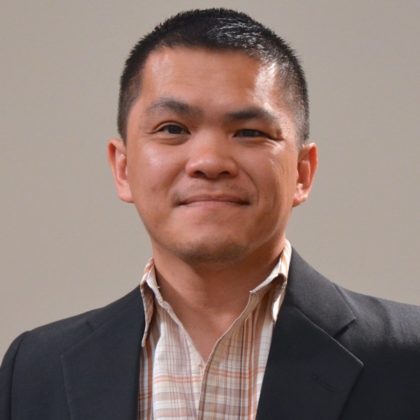
The daily news helps us keep up with the current situation. Do not allow the daily news to carry us away from our focus on Jesus. At the moment, we have family members or friends who may be ill. There are people who have died. This time of our lives scares us. This pandemic illness may lead us to better or worse days.
However, when our slumber has passed our life in God will continue. Before we jump to a conclusion, Jesus had already established that he has power over illness in other parables of the Bible. Jesus grants us some power over illness as well. He gives us the encouragement and ability to care for ourselves, to enjoy our current health, to connect with a network of support from friends and family etc…
How do we continue to live in the world in light of the Resurrection of Jesus? How do we live in light of this widespread illness? Jesus declares that he is the light of the world and uses the contrast between light and dark to illustrate an example. Jesus continues to call us to follow him, the light, so we might not stumble in the dark. He has provided the faithful many examples of being a healer and a servant through other passages of the Bible. Jesus also shows us to be loving, courageous, tenacious and diligent despite many challenges and hardships on our faith journey. God did not promise us that our faith journey would be easy, therefore he calls us often to seek strength through the Eucharist.
Read Frater Long’s full reflection.
Pam Milczarski (Major Gifts Manager for the Province Development Office)
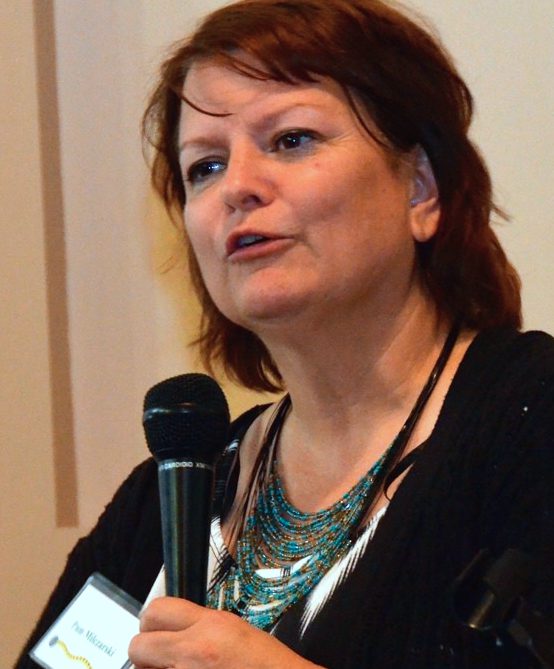
What has changed for me during this health crisis?
So much, my day to day interactions with my fellow office staff, travel to visit our donors and to my family have been curtailed. The inability to go where I want when I want halts me daily when I think about going to the store or anywhere.
What hasn’t changed for me during this health crisis?
My faith, period. I know that these uncertain times are affecting people in more ways than we know. What I do know is that while I am working from home, reaching out to our donors, my family and friends via phone calls, emails and social media, that is most important. Letting others know that we are thinking of them, praying for them, the response is a positive one, sometimes a tearful one but always ending in a prayer.
Keeping positive and prayer is what we must continue to do and if not for own sake, for those who suffer from loneliness, depression and children who can’t understand the impact. Offer prayers, offer hope even when you are feeling hopeless.
Fr. Byron Haaland, SCJ (Novice Master for the US Province)
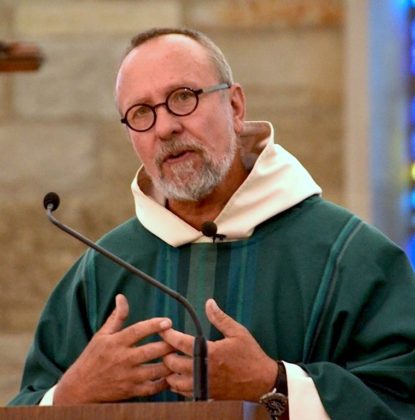
My dad was a builder of homes. This meant that he would spend time and money at City Hall obtaining the necessary permits for the many aspects of construction. The lesson he attempted to teach me was,“Don’t fight with City Hall. Do all the requirements and your life will be happy.”
During this pandemic “City Hall” has spoken. We are to pull back from our little daily freedoms and hunker down in place. New requirements seem to be posted throughout the day. It invites madness and cabin fever. Temptations abound to break these rules, to cheat just this one time.
All these directives, of course, afford us all an opportunity during this season of Lent… and beyond. It offers us TIME to be STILL and LISTEN to the God of our hearts. It’s as if the entire world has been Invited to participate in a sort of novitiate experience. Certainly, lots of things must be attended to these days but it also gifts us with TIME. It is what we choose to do with this TIME that makes all the difference. Don’t fight City Hall. Choose to be happy in place.
Read Fr. Byron’s full reflection.
Kory Christianson (Executive Director of Development, St. Joseph’s Indian School)

Our work environment is changing almost daily, but our office has three priorities during this time: ensure staff and student safety; provide on-going service to donors; and raise funds for our programs. The virus forced measures upon us to reduce personal contact. We stopped all business travel for at least two months. We postponed or cancelled personal in-home donor visits and donor luncheons. It led us to stagger department work, break and lunch schedules. It changed in-person meetings with our vendor partners to Zoom or Skype meetings. We are continuing with our scheduled mail plans amidst an environment of caution and potential mandatory shutdowns.
Even in a relatively low impact state such as South Dakota, a level of uncertainty and anxiety in the workplace looms. The Sword of Damocles hovers on such worries, as “How will this change our service to Lakota families and children? How will this affect my own family? When will this end and who might contract the virus? Can we keep the organization financially strong?”
…Recently, I heard an interview with Cardinal Timothy Dolan. He reminded me as a Christian that we are commanded not to worry (Matthew 6:25). To have concern, yes, but not to worry… Therefore, in my personal and professional life, I am trying to focus my prayers seeking strength and wisdom. How can I use this situation to help others and be a better father, husband, son, brother, friend and co-worker.
Fr. Dominic Peluse, SCJ (Spiritual Director, Province Development Office)
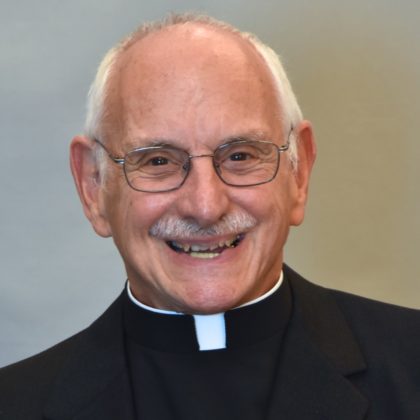
After having ministered at many parishes as a deacon and then as a priest, my new “parish” is at the Province Development Office where I am the Spiritual Director. With the coronavirus certainly affecting all humanity, I have received many, many letters and calls, not only from our donors but from others who have found references to the Priests of the Sacred Heart.
Some of the many questions asked are: What will happen if I miss a First Friday devotion? When and how can I receive Holy Communion? If I am dying, will someone be able to bring me the Last Rites (Sacrament of the sick)? Is it possible for you to hear my Confession? I need money, can you help? And with the virus affecting the economy, many apologize for not being able to contribute anything more to the ministries of the Priests of the Sacred Heart.
Listening to them on the phone I often ask if they have any special intentions when I celebrate Mass. I am often in awe at the responses that I receive and how grateful they are that their prayers are on the altar.
Read Fr. Dominic’s full reflection.
Steve Koepke (SHSM Director of Donor Relations)
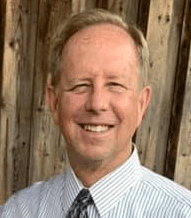
Life for me has become almost surreal. So much seems to have changed, to have been taken away… Still, I count myself among the very lucky ones. I have my health and get to come in to the office (for now anyway) and that gives my life a somewhat normal rhythm. More importantly, I feel my job here at Sacred Heart Southern Missions affords me the opportunity to be part of the solution to issues facing our country at the moment. As we struggle to keep our Social Service offices open we need the resources to pay people, to buy and move food around to our various pantries, to provide folks with hope. I recently heard where one of the largest casinos down in Tunica has closed for a month. They have 3,200 employees, mostly part time. During the shutdown they’re keeping on 150. Imagine the strain that puts on the pocketbook? I’m sure we are about to see people who have never set foot in a food pantry, nor ever expected to, in their lives.
As always, our donors remain a source of inspiration to me. After discussing the situation with one man he emailed me the next day saying he was sending $10,000 as a gift to support our efforts to provide food. Many others have also been responsive to our efforts to help those in need. It is truly humbling.
Fr. Vien Nguyen, SCJ (SHSST assistant professor)
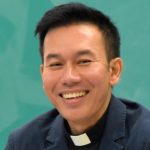
In this unprecedented time, faculty at SHSST are thrust into the new world of remote teaching/distance learning on very short notice. For some of us, it is a massive undertaking to develop interactive online courses from scratch in a short time. Charged with the instruction to utilize available institutional resources to convert all in-person classes to virtual settings, we venture into this academic cyberspace with a spirit of adaptability and collaboration.
In my short two years at SHSST, I have never taught online courses or undergone formal training in online teaching. Since I am trained in and am more comfortable with the traditional, in-person classes, I am interested in learning from other professors and remote-learning educators for tips to help develop a creative and effective online pedagogy. This means coming up with instructional strategies that encourage active participation, develop fruitful academic habits, and foster theological reflections. Many suggest that we stay connected with students individually so that they may express their concerns and that we may learn how best to meet their learning needs. Several advocate flexibility. Some propose simplicity: do less. A few recommend that we create compassionate learning environments, giving attention to the uncertainty, stress, and anxiety that our seminarians and students may experience. This is the recommendation that will take to heart as we move forward. The hope is that compassion will lead to trust and understanding.
Read Fr. Vien’s full reflection.
Fr. John Czyzynski, SCJ (retired, Sacred Heart at Monastery Lake)
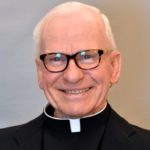
I remember visiting Poland when it was still under Communist rule and my fellow SCJs told me that if I was living there with them I would have to learn new ways of living. Something like that is going on in my life as we deal with the COVID-19 virus… In person ministry is curtailed, so adjustments need to be made. I checked if we could hear confessions over the phone. I knew that ordinarily you can’t, but I thought exceptions might be made because of the social distancing we are keeping, but I was told the old rule still holds. I am offering spiritual direction over the phone. I much prefer person to person, but it’s okay…
I don’t know what is going to happen. None of us does. But whatever it is, God is and will be Emmanuel. God is with us and hanging onto us and we need to hang onto God and hang onto one another, continue being a support to one another, but in different ways so that we can observe the distancing that will keep us and the one’s we love safe.
Read Fr. John’s full reflection.
Frater Henry Nguyen, SCJ (SHSST seminarian)
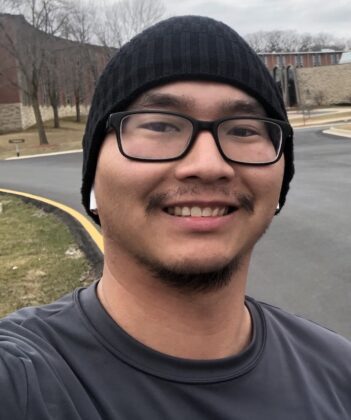
Little did I know that after spring break from Sacred Heart Seminary and School of Theology, things would not go back to “normal”. Little by little, I saw changes to my life. First, my first half marathon, the Milwaukee Marathon (slated for April 11) was canceled, which was bittersweet as I was excited but at the same time my training hasn’t been progressing as much as I would have liked. Second, classes, for the time being, have been moved online. Third, my trip to the Holy Land in May, the Holy Land Expedition with SHSST, was canceled.
About two weeks ago, we began to experience #anewnormal with a #quarantine and shortly after a #shelterinplace. During this period, SHSST and Cardinal Stritch University transitioned into completing the remainder of the semester online (how much can change in a matter of weeks!)… We are constantly distracted, wondering how many new cases of coronavirus have been identified globally, in the United States, in Wisconsin, and closer to home in Milwaukee. Are we making progress or are we far from it? How are my family and friends, young and old, near and far? Should I keep the focus on my studies and finish this virtual semester online?
One thing is constant: prayer. Prayer is especially important as we unite with everyone.
Read Frater Henry’s full reflection.
David Schimmel (Province Director of Dehonian Associates)
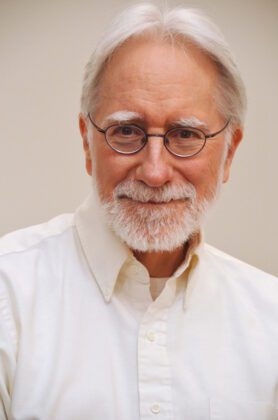
“Of all the emotions that your body is holding right now,” I asked, “which one is most prominent?” I could not see her, because this spiritual direction session was being conducted over the phone, but I could hear her heart flipping through a jumble of emotions as someone might look for a lost document in a pile of papers. She settled on fear… “I’m afraid that I’ll get sick and die, or that my husband will get sick and die, or my kids, or my grandkids, my sisters, my friends…”
I have learned that spiritual direction is the art of listening for the answer that a person doesn’t realize she has. So, I reflected back to her an earlier portion of our conversation when she tried to explain how much she was missing her grandkids. “You told me that you and your husband put together some things to send to your grandkids—3 and 9 years-old—and you wrote a letter to place in each envelope. You may not be able to show them your love with a hug, but you found another way. Don’t let fear dismiss this as an insignificant act”…
In this time of crisis, simple, loving gestures have infinitely more staying power than a stockpile of toilet paper.
Br. Diego Diaz, SCJ (Mississippi community)

The global pandemic has changed our daily routine. Schedules, classes, meetings, everything changes day by day. Human beings seem to have become more vulnerable. We thought we were invincible.
Personally, I am learning new ways to interact with people through video calls, online classes and I even had to do a Eucharistic Adoration transmitted from the St. Michael community prayer room for a group of people who had asked me to lead them in prayer on Sunday afternoon. The virus moves with a speed that makes people have to learn faster and faster. At the same time, it is very simple, clear and concrete how we can take care of each other. Wash your hands, keep your social distance and if you are sick, stay home and rest…
A few days ago I was reading about collective intelligence, that is, that intelligence that species possess and that allows them to make collective decisions to survive (some examples are found bees and ants). This pandemic is leading us to learn together, to stop and to be in solidarity with each other. Without a doubt, when this ends we will have to be a new humanity, more fraternal, taking care of each other, being responsible for the care of the environment.
Read Br. Diego’s full reflection.
Fr. Praveen Kumar Richard, SCJ (South Dakota community)
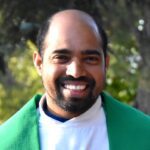
The pandemic has placed the whole world in a situation of fear and panic; the normal life of every single person is upended, regardless of age. Those of us living in the small town of Chamberlan, SD, are no different. This pandemic has impacted us in many ways. Following the guidelines of the CDC and other agencies, we extended spring break at St. Joseph’s Indian School and asked the students to remain at home until further notice. At the same time, we are concerned about their nutrition, knowing that not all families are able to provide what is needed. Thus, staff from St. Joseph’s went to the reservations with food donations for the families.
Life on campus has been more quiet and almost lifeless. We work at our respective offices, yet we avoid personal interactions and meetings because others’ safety is our responsibility. Personally, I often feel helpless. However, the isolation is needed in the battle to prevent the wider spread of COVID-19.
